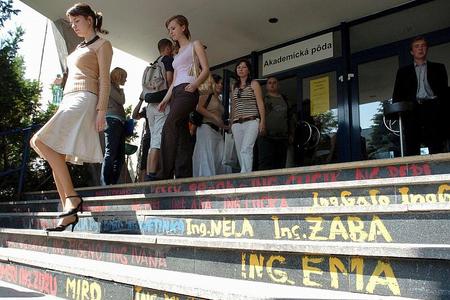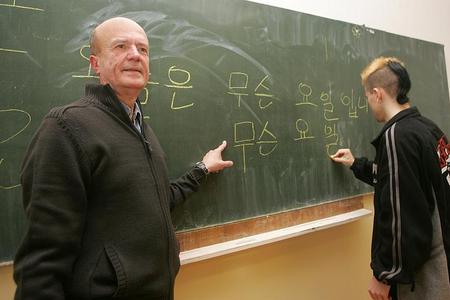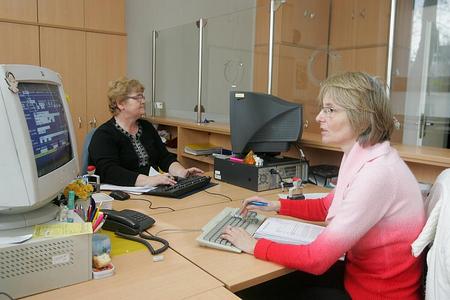Career and HR, page 23
Employment news from Slovakia
LINKS BETWEEN BUSINESS AND ACADEMIA IN SLOVAKIA – some examples
Aurel Stodola Energy Award- awarded by Slovenské Elektrárne in cooperation with the Slovak University of Technology in Bratislava for the best bachelors', masters' and PhD theses.
Learning more about auditing from the Big 4
AUDITING is not only checking out the numbers on a balance sheet. The job of an auditor is much more, embracing aspects related to the financial crisis, other financial statements and fraud.
Firms are getting involved
AN EDUCATED labour force is one of the most precious assets a company has. Firms in Slovakia, which until the crisis struck with full force were loudly complaining about a shortage of qualified labour, are well aware of this. In order to have a pool from which to select workers able to meet their requirements, companies have started to establish relationships in the education system, work on scientific and research projects with schools, and support students either by granting awards and scholarships, or in other ways.
THE UNIVERSITY SYSTEM IN SLOVAKIA
Universities in Slovakia: 35
Rectors share their ideas
THE QUESTION of the degree of interconnection between academia and practice is an age-old issue, but universities of technology in Slovakia do not view the current level as insufficient. Rather, the universities see a need for greater support from the state, in particular for their pursuit of scientific and research activities. They also want to see a boost in the promotion of technological studies among students even though the two biggest Slovak universities of technology do not complain of too few applicants.
Europe’s hopes for university reform
The European Commission (EC) is calling for a wide reform of European universities and higher education institutions suggesting that they “have failed to unleash their full potential so as to stimulate economic growth, social cohesion and improvement in the quality and quantity of jobs”. More flexibility and a more sympathetic ear for the needs of the labour market; greater diversity in the programmes they offer; more mobility for both students and teachers; flexible admission policies; and improved human resources policies at the universities: all these items are on the EC’s wish-list. But the commission is not alone in wanting them: business representatives and human resources professionals share its vision of a root-and-branch reform of universities in Europe, not least in Slovakia.
European Commission acts to preserve jobs in turbulent times
Europe is facing difficult economic times, people are worried about their jobs and their concerns are fully understandable, says European Commissioner for Employment, Social Affairs and Equal Opportunities Vladimír Špidla. In an interview with The Slovak Spectator, Špidla explains that the commission has already taken much action to ease the impacts of the economic crisis on the real economy and especially to preserve jobs. But the commissioner agrees that there are many challenges ahead.
Europe needs creative and innovative people
European Commissioner for Education, Training, Culture and Youth Ján Figeľ believes that education in the right skills can provide an insurance policy against turbulence on the labour market. Figeľ also advocates reform of universities Europe-wide. According to the commissioner, most universities in the European Union still have to improve their cooperation with businesses by opening up to new types of students, especially adults, and modernising their curricula. The Slovak Spectator spoke to Figeľ about lifelong learning, mobility within academia and the need to focus on research and innovation.
Slovaks return as British pound weakens
THE BRITISH pound has long since lost its shine – for Slovaks. This is especially true if they calculate how much they could have earned in Britain several years ago, and how much this would be worth now. This may have led more than one fifth of the Slovaks who had moved to Britain to return home, the Sme daily wrote in August.
Education is the most -frequently provided employee benefit
EMPLOYERS motivate their employees to perform better in several ways. One is to provide benefits.Since August 2007, more than 135,000 users have taken part in an internet poll about wages conducted by Merces.sk, part of Profesia. The poll looked at 14 of the most common benefits which employers offer employees. The responses suggest that the most frequently provided benefit is education for employees, while the least common benefit is a contribution to health insurance. One third of the respondents did not list any benefit.
ICF now in Slovakia
The ICF (International Coach Federation)now has a chapter in Slovakia, founded in the middle of 2007 by four ICF members: Marián Fabian, Klára Giertlová, Alfonz Haviar, and Zlatica Stubbs.
Bricklayers wanted: pay is better than teachers’
CONSTRUCTION is one industry which is grappling with a lack of qualified workers. As long as two years ago, the Construction Ministry announced that the construction sector in Slovakia was short of about 1,800 to 2,000 qualified workers, the Sme daily reported.
The joys of teambuilding
SLOVAK firms are warming up to teambuilding, which uses activities indirectly related to their employees’ work to improve quality and lift morale.
Part-timers are a lonely few
SLOVAKIA is behind the curve in Europe when it comes to part-time employment: only Bulgaria has fewer people using this form of employment.According to Eurostat data, only 2.6 percent of all employees in Slovakia work on part-time contracts, while in the European Union 18.2 percent do so.While the country’s legislation presents no particular obstacles to part-time employment, employers themselves are rather reluctant to use it. Human resources professionals say it is a pity that the option is not used more widely since it can benefit both employers and employees alike.
Gender gap widening in Slovak labour market
WOMEN in Slovakia are more likely to have university degrees than men, are more interested in improving their IT skills, and are more likely to be willing to make concessions to keep their jobs. At the same time, they hold just 30 percent of the best jobs as managers, executives and legislators, and earn, on average, 27 percent less than men.
Companies want to employ more foreigners
EMPLOYERS in Slovakia have a growing interest in employing foreigners. The head of the Slovak Centre for Labour, Social Affairs and Family, Ján Sihelský, recently told an international conference about the lack of qualified labour: by the end of this July there were 15,000 European Union and developing country citizens working in Slovakia, the Pravda daily wrote.
Slovaks commute, but aren't so keen to relocate
AMERICANS often follow lucrative job offers by relocating their whole family from one place to another, depending on how local labour markets develop and how their career paths change. Slovaks, like many of their European neighbours, have never really adopted this habit and tend to stay in their community, or commute to work daily or weekly instead.
Corporate investment should flow into schools
THE SLOVAK government is working on a law which will enable companies to finance the professional training of pupils and even found their own schools. At its session on August 27, the government approved as a legislative goal a law on professional education and professional training. This will create a system to coordinate professional education and training with labour market needs, the Education Ministry said on its website. The new law will introduce criteria for the involvement of employers and employers’ unions in professional education, and will allow for private capital to be invested.
Modern approach to recruitment
Sophisticated and systematic recruitment is key to company success. Unprecedented competitive pressure witnessed today is a compelling reason for companies to finding a new approach to selecting and keeping employees. Lack of suitable candidates has reshaped the position of HR experts on election procedures and manoeuvred them towards using the full potential of IT and HR marketingmechanisms.
Ministry aims for secure IT system
THE EDUCATION Ministry has announced a tender for testing the security of its IT systems, starting on July 1.
- Ryanair to withdraw from Slovak airport
- Don’t you want to?
- Last Week: Fico the antagonist caters to his voters at home
- Caught by the gravitational pull of Europe, this American is rediscovering his Slovak roots
- “Are you a citizen yet?”
- Slovakia’s “Mont Ventoux” opens to cyclists
- A comedian’s guide to Košice, the city that is better than you think Audio
- Slovakia’s economy enters increasingly troubled waters
- Don’t you want to?
- Caught by the gravitational pull of Europe, this American is rediscovering his Slovak roots
- Ryanair to withdraw from Slovak airport
- “Are you a citizen yet?”
- Slovakia’s “Mont Ventoux” opens to cyclists
- A comedian’s guide to Košice, the city that is better than you think Audio
- Slovakia’s economy enters increasingly troubled waters
- Last Week: Fico the antagonist caters to his voters at home
- Ryanair to withdraw from Slovak airport
- Don’t you want to?
- Caught by the gravitational pull of Europe, this American is rediscovering his Slovak roots
- “Are you a citizen yet?”
- Slovakia’s “Mont Ventoux” opens to cyclists
- A top manager is flying across the Atlantic to watch a big match in Slovakia
- Slovakia’s economy enters increasingly troubled waters
- A comedian’s guide to Košice, the city that is better than you think Audio
- Ryanair to withdraw from Slovak airport
- Don’t you want to?
- Caught by the gravitational pull of Europe, this American is rediscovering his Slovak roots
- “Are you a citizen yet?”
- Slovakia’s “Mont Ventoux” opens to cyclists
- A top manager is flying across the Atlantic to watch a big match in Slovakia
- Slovakia’s economy enters increasingly troubled waters
- Bratislava’s Nová Tržnica reinvents itself with Yellow Thursdays Photo
- Catching up with science in Slovakia: New SAV chair and grant for scientists
- The Slovak getaway that once witnessed a failed terror plot
- Last Week: Fico the antagonist caters to his voters at home
- News digest: Fico and Danko wage Facebook flame war over Ukraine EU membership
- A top manager is flying across the Atlantic to watch a big match in Slovakia
- Malt from Trnava wins EU protected status, cementing Slovakia’s agricultural edge
- A comedian’s guide to Košice, the city that is better than you think Audio
- Weekend: Jumpstart your summer festival season Photo More articles ›














